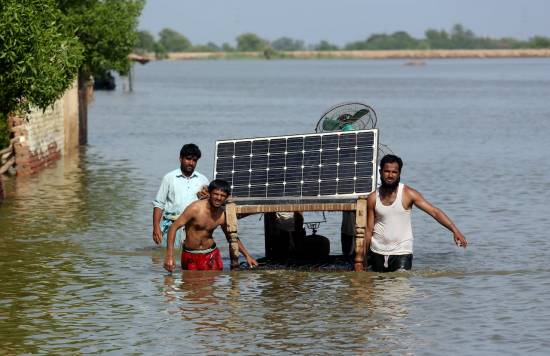Millions in flood-hit Pakistan await aid as health crisis unfolds Featured
International aid agencies have warned that water-borne diseases such as diarrhoea and malaria are spreading fast and tens of thousands of people, especially children, are vulnerable.
The death toll has reached 1,300. Aid workers say the count will go up unless urgent steps are taken to address food and medical emergencies.
Pakistan’s health infrastructure in much of the rural Sindh and neighbouring Balochistan province was already in poor shape. Run-down dispensaries lack trained doctors and patients often lie on floors due to a shortage of beds.
In light of the scale of the crisis, the UN issued a $160 million appeal to international donors to address the public health emergency.
Displaced families have set up makeshift tents using salvaged bed coverings and plastic sheets. Some of them lie on charpoys under the shade of Lai trees to escape sweltering temperatures, which have risen to 38-degree celsius in recent days.
Hunger and suffering is everywhere. Under the blazing sun, women and children chase passing cars in hopes someone might throw a few breadcrumbs at them.
These temporary settlements are also in desperate need of mosquito nets and clean drinking water.
“It’s a health catastrophe which is unfolding before us,” says Dr Abdul Ghafoor, who is part of Pakistan Medical Association, which has set up makeshift clinics in flood-affected areas.
“Skin infections are spreading fast as almost every district in the Sindh province is still inundated. That’s mainly because people have been forced to drink stagnant water.”
PMA medical camps run by a handful of doctors have been overwhelmed by thousands of patients, he says.
“We need immediate assistance otherwise the situation is only going to get worse.”
August saw record rains in Pakistan, according to the Pakistan Meteorological Department began keeping the record.
With roads washed away, aid workers are struggling to take the much-needed relief from Karachi, Pakistan’s largest city, to the worst-hit areas.
For instance, mosquito nets, which are easy to buy and transport, are difficult to come by. Some of the stores, which are still open, are selling the nets at double the market price.
“More than two-thirds of the patients that we are treating have malaria,” says PMA’s Ghafoor.
In Pakistan’s rural areas where the birth rate is still well above the global average, it's common for one woman to have 4-5 children, which means there is a large number of pregnant women amongst the displaced who are particularly at risk of catching infectious diseases.
At a relief camp in a village, some 50km from Badin city, doctors treated 800 women and 157 of them were pregnant. “Those pregnant women are in really bad shape,” says another volunteer.
Aid workers say widespread poverty and the accompanying malnourishment were already a big headache for Islamabad and now floods have added to those worries.
“Everywhere we go we encounter people who have high fever, diarrhoea, symptoms of malaria and they are vomiting,” says Humaira Bachal, a volunteer who is running a medical camp at a village near Badin city.
Pakistan was already reeling under an economic crisis, fueled by depleting foreign currency reserves. The government of Prime Minister Shahbaz Sharif secured a $1.17 billion IMF loan on August 29 after months of wait.
However, that won’t be enough to deal with the ravages of the floods, which have badly affected the agricultural sector with the UN estimating that more than two-thirds of the crops in Sindh alone have been destroyed.
Inflation hit a 47-year high last month as food shortages propelled the prices.
Many of the displaced villagers work on farms for meagre daily wages. With no money in hand, some of them are still wading through 2-3 feet of water in the fields to make a living.
“We make 250 rupees ($1.12) picking up a maund (37kgs) of cotton. Me and my wife would normally do 2-3 maunds in a day. But now we can hardly manage one maund,” a villager tells TRT World.
The floods have exposed the unpreparedness of the government to deal with a natural calamity on such a scale. At the same time private aid agencies are struggling to reach millions of people scattered on the fringes of far-off towns.
Whatever little aid makes its way to the displaced people is distributed in such a haphazard manner that people with even hungry stomachs are yearning for some dignity.
Sabir Hussaian, a resident of Dadu district, saw in dismay when sacks of ration were dropped from helicopters and people pushed and fought to get their hands on them.
“For God’s sake, we end up fighting when you distribute aid like this. You leave but in our part of the world these fights over a sack of food turn into family feuds, which last for decades.”
Source: TRT World


